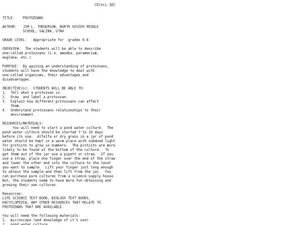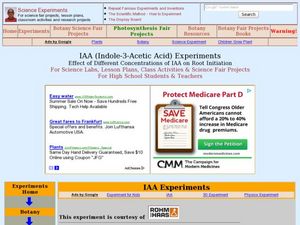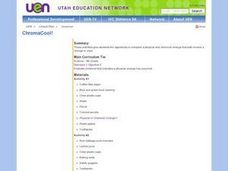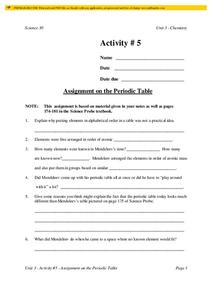Curated OER
Ecosystems: A Home By Any Other Name
Students can learn more about the parts of ecosystems through exploration and hands on activities.
Curated OER
Life in a Forest Stream
Students assess macro-invertebrates from a stream. In this science lesson plan, students observe, classify and identify organisms found in a stream. A lab station is constructed at the stream sight and students study the different...
Curated OER
Urban Life: What Lives In Our Local Park?
Fifth graders participate in activities during a visit to Central Park. In this urban life lesson, 5th graders visit Central Park where they explore pond dipping, stream chemistry, and play a native plant Bingo game.
Curated OER
Can Acid and Bases Remedy the Body?
Students experiment with acids and bases using technology-based "probe-ware", computers, and household products in this exciting biology/chemistry lesson plan. The lesson plan was written for an advanced 6th grade class.
Curated OER
Periodic Table of Elements
Beginning chemists examine a collection of elements and compounds as they are introduced to the periodic table. The lesson plan is not cohesive and does not provide detailed instructions on how to teach it. However, it does includes a...
Curated OER
Pop Rocket - Trash to Treasure
First off, Newton's laws of motion aren't often taught at 2nd grade, so this lesson may be more appropriate for upper elementary learners. It begins with a discussion and demonstration of the laws of motion, and then has individuals...
Curated OER
Protozoans
Learners examine protozoans and their advantages and disadvantages. In this chemistry lesson students explain what a protozoan is then draw and label one.
Curated OER
Thermoset Polymers
Students complete a lab activity with polymers to allow them to better understand how to make "observations". In this science lesson students make measurements and collect data.
Curated OER
Is it Alive?
Students watch a demonstration using Duco glue and water and try to determine if the "monster" shown is alive. After the demonstration, they discuss what characteristics make an organism "alive". They participate in a card sorting...
Kenan Fellows
Effects of a Golf Course on Stream Health
Is the golf course causing issues in the stream? Find out with a resource that has groups perform chemical water tests to analyze the effects of a golf course on a stream. Pupils collect water above and below the course and analyze the...
University of Minnesota
Dendritic Spines Lab
This is your brain on drugs ... literally! Your neuroscientists-in-training examine the evidence of drug use on the human brain and how neurons change their connectivity when altered by drugs. They then work together to create testing...
Chicago Botanic Garden
Carbon, Greenhouse Gases, and Climate
Climate models mathematically represent the interactions of the atmosphere, oceans, land, sun, surface, and ice. Part two in the series of four lessons looks at the role greenhouse gases play in keeping Earth warm and has participants...
Chymist
How Do We Affect the Quality of Our Atmosphere
Explore the makeup of the earth's atmosphere. Using the set of specific experiments, pupils examine the main elements and compounds present in the atmosphere. Their study extends to investigate the effects of atmospheric pollution such...
University of Southern California
Mastering Microbes
Small but mighty! Learners explore the role of microbes in a healthy ecosystem. An engaging lesson asks pupils to design an aquaponics system that demonstrates that healthy microbes are necessary to maintain the ecosystem.
Dearborn Public Schools
Parent Informational Meeting
What factors should parents and guardians consider when helping their children select high school courses each year? A presentation designed for Parent Information Night outlines the requirements students must meet in order to graduate.
Curated OER
Teaching about the Effect of Photosynthesis and
Students demonstrate the effects of photosynthesis and respiration. They decide which variables to analyze in a microcosm study. They produce a written paper, oral presentation, poster, or multi-media presentation
Curated OER
Auxin: Indole-3-Acetic Acid (AAA), A Hormone with Diverse Effects: Synthesis and Applications
Learners synthesize Indole-3-Acetic acid from 3-indolylacetonitrile. In this biochemistry lesson, students determine the effect of different concentrations of IAA on lima beans. They explain how hormones help in plant development.
Curated OER
History of the Periodic Table
Learners sort a group of manipulatives and then explain their organizational system to the class. They discuss the work of scientists trying to organize the elements into a system that made sense and the development of the periodic table.
Curated OER
Fred the Fish -- A River Ran Wild
Students apply cause and effect relationships to water pollution in a stream. In this pollution lesson students recognize the importance of clean water in their daily lives. Students accompany "Fred the Fish" as he travels down stream....
Curated OER
Great Lakes Ecology
High schoolers are able to use a secchi disk to measure the turbidity of water by determining the depth at which the sechi disk is no longer visible and using the data in a formula to quantify the results. They are able to use Vernier...
Curated OER
The Greenhouse Effect and Me: How Do We Affect Each Other?
Ninth graders create a model of greenhouse effect in the lab. In this integrated science lesson, 9th graders investigate the different variables affecting this condition. They research about global warming and prepare a PowerPoint...
Curated OER
ChromaCool!
Fifth graders watch a video about physical and chemical changes. In groups, they participate in a variety of activities involving color. They write their observations in a journal. To end the lesson, they use a checklist to classify...
Curated OER
Periodic Table
In this periodic table worksheet, students determine why the periodic table is organized the way it is and compare and contrast the characteristics of the different grouping of elements. This worksheet has 22 short answer and 36 fill in...
Curated OER
Acid, Base, or Salt?
In this acids and bases worksheet, students read about the differences between acids and bases and then complete a table comparing the characteristics of both. Then students determine if the given statements describe an acid, base, or...

























